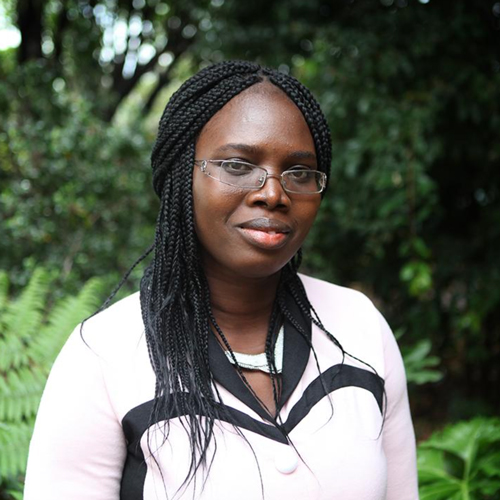Mojisola Karigidi est une scientifique en début de carrière et une conférencière dans le domaine de la biochimie qui s'intéresse particulièrement aux aliments fonctionnels, aux plantes médicinales et à leur rôle dans la prévention des maladies. Mojisola Esther Ojebode est l'aînée d'une famille de trois filles dont les parents étaient favorables à l'enseignement supérieur. Enfant curieuse, elle se souvient s'être demandée comment étaient déterminées les dates de péremption des aliments. "J'ai toujours aimé tout ce qui avait trait à la science et je l'ai étudiée dans l'espoir qu'elle me permettrait de lutter contre les problèmes environnementaux dans ma communauté, tels que le problème des parasites dans les exploitations agricoles. Le domaine de recherche d'Ojebode est la métalobomique, l'étude scientifique des processus chimiques impliquant des métabolites, qui sont extraits des plantes. "La métabolomique implique l'utilisation d'une approche solide pour découvrir ce que font les pesticides et pour s'assurer qu'ils agissent sur les parasites et non sur les humains qui les appliquent", explique-t-elle. "En d'autres termes, ils doivent être biosélectifs. Le processus consiste à prendre une plante modèle dont le codage génétique a déjà été séquencé. Ensuite, ils prennent des composés dont les bioactivités sont déjà connues. Nous les appliquons à la plante modèle pour obtenir leurs "empreintes" métaboliques par chromatographie en phase gazeuse", explique M. Ojebode. "Cela nous permet de connaître l'effet des composés appliqués sur la plante. Nous faisons cela sur plusieurs plantes en utilisant plusieurs composés afin d'avoir une large gamme à examiner". Mme Ojebode a effectué ces tests sur la citronnelle et le dongoyaro (Azadirachta indica), une plante médicinale que les gens sèment autour de leur maison pour éloigner les insectes. Elle dispose désormais de suffisamment d'informations pour alimenter les bases de données d'organismes scientifiques tels que l'International Metabolomics Society. Mme Ojebode s'est inscrite à un master en biochimie industrielle et nutritionnelle à l'université d'Ibadan, qu'elle espère commencer bientôt. "J'ai l'intention de m'attaquer aux problèmes auxquels est confrontée l'industrie agrochimique, tels que les agents de protection des cultures qui ne sont pas biosélectifs", explique-t-elle. "Ils veulent y remédier en utilisant des produits chimiques, mais je veux les inciter à utiliser des produits naturels dérivés de plantes qui ont des propriétés protectrices. Il faut être sélectif - plutôt que de pulvériser à tort et à travers - pour protéger les cultures et ceux qui les consomment. "J'ai l'intention de m'attaquer aux problèmes auxquels est confrontée l'industrie agrochimique, tels que les agents de protection des cultures qui ne sont pas biosélectifs. Mme Ojebode souhaite concevoir une technologie spécialement destinée aux petits exploitants agricoles, dont la plupart sont des femmes, qui leur permettra de traiter leurs cultures à l'aide de méthodes naturelles. Elle prévoit d'organiser un salon de l'emploi pour apprendre aux femmes à utiliser ces produits. "C'est là que la métabolomique entre en jeu - vous pouvez mesurer à l'aide d'instruments. Préoccupée par le fait que de moins en moins de personnes s'engagent dans l'agriculture, Mme Ojebode veut être un modèle, en particulier pour les jeunes femmes. Lorsqu'elle voit que les gens appliquent ce qu'elle leur a enseigné et gagnent ainsi de l'argent, elle est plus que satisfaite. "J'ai l'impression de toucher des vies et de ne pas me contenter d'exister pour moi-même.

